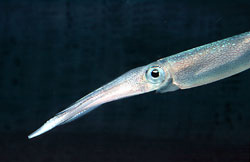
Scientists devise technique to detect squid egg clusters on the seafloor
California’s $30-million-a-year squid fishery has quadrupled in the past decade, but until now there has been no way to assess the continuing viability of squid stocks. A multi-institutional team of scientists this month reported a new sonar technique to locate squid egg clusters in the murky depths, offering a window onto next year’s potential squid population in its nursery.
The scientists demonstra
New research on Antarctic krill (Euphausia superba), a shrimp-like animal at the heart of the Southern Ocean food chain, reveals behaviour that shows that they absorb and transfer more carbon from the Earth’s surface than was previously understood. The results are published this week in the journal Current Biology.
Scientists from British Antarctic Survey (BAS) and Scarborough Centre of Coastal Studies at the University of Hull discovered that rather than doing so once per 24 hours, Ant
Work could help definitively determine whether fish populations are shrinking
Researchers at MIT have found a new way of looking beneath the ocean surface that could help definitively determine whether fish populations are shrinking.
A remote sensor system developed by Associate Professor Nicholas Makris of mechanical engineering, along with others at MIT, Northeastern University and the Naval Research Laboratory, allows scientists to track enormous fish populatio
Study suggests steps a planet must go through for complex animal life to arise
Clay made animal life possible on Earth, a UC Riverside-led study finds. A sudden increase in oxygen in the Earth’s recent geological history, widely considered necessary for the expansion of animal life, occurred just as the rate of clay formation on the Earth’s surface also increased, the researchers report.
“Our study shows for the first time that the initial soils covering the te
Radar satellites such as ESA’s Envisat and ERS-2 maintain constant watch on the Earth’s surface, their signals able to cut through clouds, rain or darkness. This surveillance extends beyond the land to the 71% of the planet covered by ocean – acquiring unique imagery of the ever-shifting face of the sea that is proving a boon to oceanographers.
Last week around 100 researchers from 20 countries met at ESRIN, ESA’s European Centre for Earth Observation in Frascati, I
Conceptual model of krill’s life history sheds light on forces that drove its evolution
Although Antarctic krill (Euphausia superba) are one of the best-studied organisms of the open sea, key aspects of their life cycle have remained murky. Understanding krill is important because they are vital prey for fish, birds, and marine mammals, yet they are vulnerable to fishing pressure and environmental change. In the February 2006 issue of BioScience, the monthly journal of t